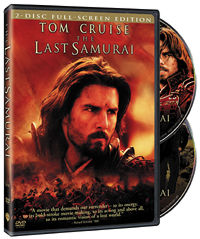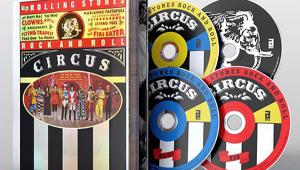The Last Samurai
Picture ** 1/2
Sound *** 1/2
Film ** 1/2
An all-out epic that works only up to a point, The Last Samurai tells the story of a highly decorated but run-down American army officer hired by the Japanese to train that country's first modern army. Nathan Algren drinks too much and barely manages to scrape out a living with a seedy stage act, sponsored by the Winchester Rifle Company, relating his experiences in the Indian Wars. Why the Japanese would choose Algren to train their army, despite his military record, is only the first puzzle posed by this film.
 As he arrives in Japan, Algren learns that the new army's first assignment will be to put down a rebellion of samurai who are willing to fight to maintain Japanese society's traditional structure, which is threatened by the modernization being pushed by the young emperor, Meiji. In the filmmakers' version, Meiji appears to be the puppet of wealthy, emerging Japanese industrialists eager to bring Japan into the 19th century and, of course, enhance their fortunes along the way.
As he arrives in Japan, Algren learns that the new army's first assignment will be to put down a rebellion of samurai who are willing to fight to maintain Japanese society's traditional structure, which is threatened by the modernization being pushed by the young emperor, Meiji. In the filmmakers' version, Meiji appears to be the puppet of wealthy, emerging Japanese industrialists eager to bring Japan into the 19th century and, of course, enhance their fortunes along the way.
Algren's first encounter with the samurai does not go well for him or the new army. Captured and brought to an idyllic Japanese village high in the hills (of New Zealand, where much of the film was shot), he is eventually captivated by Japanese traditional society and convinced that he has been fighting on the wrong side.
The movie is beautifully photographed, the actors earnest and convincing—Ken Watanabe's riveting portrayal of the feudal samurai warlord completely upstages a fine Tom Cruise performance. The story is absorbing, and the final battle scenes alone are worth the price of the disc. But I kept being distracted by some inconvenient facts.
Inconvenient Fact 1: By the late 19th century, the samurai were little more than feudal warriors serving masters who dominated legions of peasants. The top-dog samurai had, for centuries, been the Shogun—Japan's military dictator. The emperor was a god-figurehead, a situation that changed only when the last Shogun was forced to resign, in 1867. The samurai were hardly benevolent, and rigid customs demanded the peasants' total obedience to them. Whether or not the emergence of a new system would be better for the common Japanese citizen was open to question. Judging from the next 70 years of Japanese history, it was not. But at the time of the samurais' last stand, in the 1870s, they could hardly be considered the good guys. However, The Last Samurai's painting of them as the doomed heroes of a sort of "Dances With Swords" story made me wish that the screenwriters had dealt more honestly with the contradictions inherent in Algren's position.
Inconvenient Fact 2: Not only was the selection of an officer like Algren an unlikely choice to train the Japanese army, the US would have been an unlikely choice to provide military assistance in the first place. True, we had recently come through thefires of our own civil war, and the campaigns against the Native Americans might have produced in the minds of the Japanese a parallel with their own struggles against renegade samurai. But Britain, France, or Germany would have been far more likely sources of military expertise. In fact, I am unaware of any evidence that the US provided military assistance to Japan or anyone else in the late 19th century, when we barely maintained a standing military of our own.
But if you can ignore all that (I tried, with limited success), you'll enjoy The Last Samurai, and the fine collection of extras will help. There's a commentary by director Ed Zwick, deleted scenes, a trailer, and nine features, including the History Channel documentary History vs. Hollywood: The Last Samurai.
I first saw the film in a theatrical DLP presentation, which was startlingly crisp. This video transfer is very soft, but it's also clean, with rich colors, fine shadow detail, and no significant edge enhancement. The sound is dynamic and full-bodied, particularly in the final battle scenes.
The Last Samurai is a mixed bag, and the subject of Japanese feudal society is much better told in the classic miniseries Shogun (though that story is set more than 250 years earlier). But I've been a fan of director Ed Zwick's work since Glory, a 1989 film that remains one of my all-time favorites. Zwick likes big, emotion-filled epics, such as his Legends of the Fall. Though this isn't his best work, it's his most ambitious, and worth a look.—TJN
- Log in or register to post comments






























































